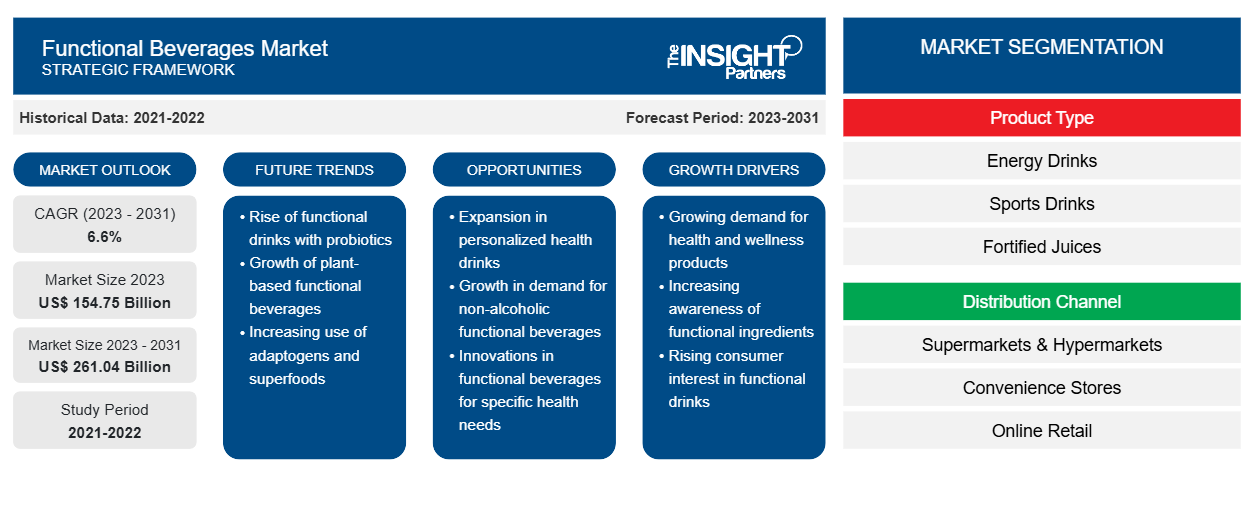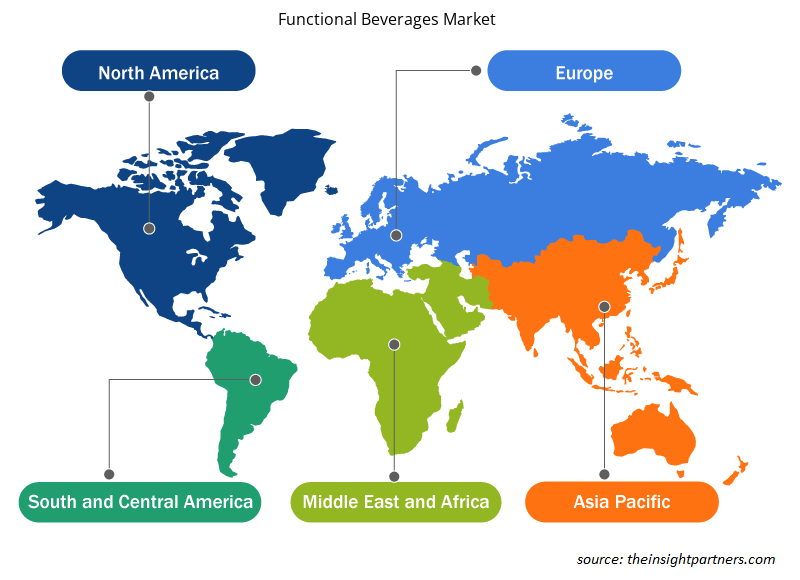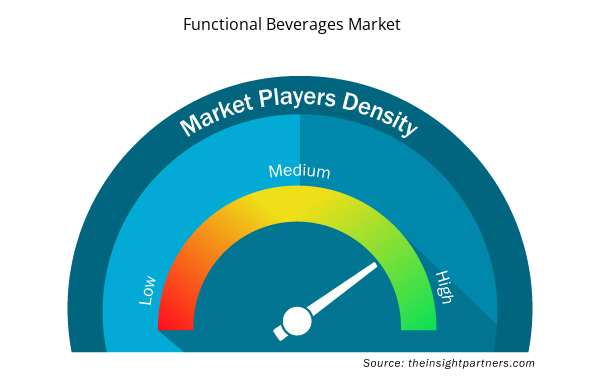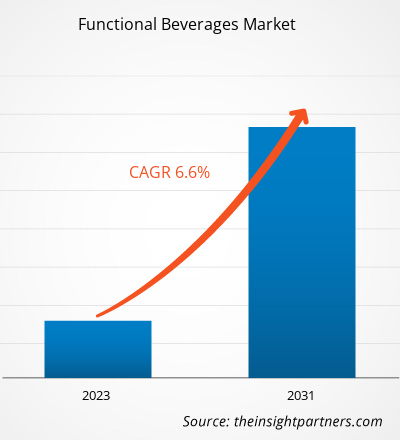The functional beverages market size is projected to reach US$ 261.04 billion by 2031 from US$ 154.75 billion in 2023. The market is expected to register a CAGR of 6.6% during 2023–2031. Increasing health consciousness are likely to remain key functional beverages market trends.
Functional Beverages Market Analysis
The functional beverages market analysis revealed a thriving and dynamic landscape driven by evolving consumer preferences, technological advancements, and health and wellness trends. The increasing health consciousness among consumers has surged the demand for beverages that offer functional benefits beyond basic hydration. This includes beverages fortified with vitamins, minerals, antioxidants, probiotics, and other bioactive ingredients to support specific health goals such as energy enhancement, immune support, digestive health, and stress reduction. Market trends indicate a shift toward clean-label products with natural ingredients, minimal processing, and transparency in sourcing and manufacturing practices.
Functional Beverages Market Overview
The functional beverages market has experienced significant growth in recent years due to increasing consumer awareness of the health benefits associated with these beverages. Apart from basic hydration, functional beverages also offer added health benefits such as improved energy, cognitive function, immunity, or weight management. These beverages are infused with vitamins, herbs, minerals, or other ingredients to promote health and well-being. One of the key factors driving the growth of the functional beverages market is the rising demand for convenient and on-the-go health solutions. Busy lifestyles and a growing focus on wellness have led consumers to seek out beverages that not only taste good but also provide functional benefits. This trend has led to the development of a wide range of functional beverages, including energy drinks, sports drinks, fortified waters, and ready-to-drink tea and coffee.
Customize This Report To Suit Your Requirement
You will get customization on any report - free of charge - including parts of this report, or country-level analysis, Excel Data pack, as well as avail great offers and discounts for start-ups & universities
Functional Beverages Market: Strategic Insights

- Get Top Key Market Trends of this report.This FREE sample will include data analysis, ranging from market trends to estimates and forecasts.
You will get customization on any report - free of charge - including parts of this report, or country-level analysis, Excel Data pack, as well as avail great offers and discounts for start-ups & universities
Functional Beverages Market: Strategic Insights

- Get Top Key Market Trends of this report.This FREE sample will include data analysis, ranging from market trends to estimates and forecasts.
Functional Beverages Market Drivers and Opportunities
Increasing Health Consciousness
The shift toward healthier lifestyles has propelled the demand for functional beverages that offer more than just hydration. Consumers are increasingly seeking beverages that provide additional health benefits, such as vitamins, minerals, antioxidants, probiotics, and other bioactive ingredients. These functional beverages are perceived as healthier alternatives to traditional sugary drinks, aligning with the choices of health-conscious consumers looking to improve their overall well-being. Vitamins and minerals are essential nutrients that support various bodily functions, while antioxidants help combat oxidative stress and inflammation in the body. On the other hand, probiotics promote gut health and digestion by introducing beneficial bacteria to the digestive system.
Rising Interest in Wellness and Self-Care
The rising focus on wellness and self-care has significantly influenced consumer preferences, leading to a surge in demand for functional beverages tailored to support specific health goals. Whether it is boosting energy levels, strengthening the immune system, promoting digestive health, managing weight, or reducing stress, consumers are seeking beverages that offer targeted functional benefits aligned with their wellness objectives.
Functional Beverages Market Report Segmentation Analysis
The key segments that contributed to the derivation of the functional beverages market analysis are product type and distribution channel.
- Based on product type, the functional beverages market is segmented into energy drinks, sports drinks, fortified juices, functional water, and others. The energy drinks segment held the largest market share in 2023.
- Based on distribution channel, the functional beverages market is segmented into supermarkets & hypermarkets, convenience stores, online retail, and others. The supermarkets & hypermarkets segment held the largest market share in 2023.
Functional Beverages Market Share Analysis by Geography
The geographic scope of the functional beverages market report is mainly divided into five regions: North America, Asia Pacific, Europe, the Middle East & Africa, and South America/South & Central America.
The North America functional beverages market is growing prominently owing to the rising population and booming food & beverage industry. The rising number of health- and fitness-conscious individuals in North America has increased the demand for functional products, impacting all menu elements; the beverage category holds the biggest opportunity for flavor innovation. In addition, the popularity of zero-calorie, zero-sugar, and low-carb soft beverages and plant-based beverages is growing across the region, driving the functional beverages market. Moreover, the rising vegan population and the growing trend of veganism are boosting the demand for plant-based functional beverages, such as plant-based milk.
Functional Beverages Market Regional Insights
The regional trends and factors influencing the Functional Beverages Market throughout the forecast period have been thoroughly explained by the analysts at Insight Partners. This section also discusses Functional Beverages Market segments and geography across North America, Europe, Asia Pacific, Middle East and Africa, and South and Central America.

- Get the Regional Specific Data for Functional Beverages Market
Functional Beverages Market Report Scope
| Report Attribute | Details |
|---|---|
| Market size in 2023 | US$ 154.75 Billion |
| Market Size by 2031 | US$ 261.04 Billion |
| Global CAGR (2023 - 2031) | 6.6% |
| Historical Data | 2021-2022 |
| Forecast period | 2023-2031 |
| Segments Covered |
By Product Type
|
| Regions and Countries Covered | North America
|
| Market leaders and key company profiles |
Functional Beverages Market Players Density: Understanding Its Impact on Business Dynamics
The Functional Beverages Market is growing rapidly, driven by increasing end-user demand due to factors such as evolving consumer preferences, technological advancements, and greater awareness of the product's benefits. As demand rises, businesses are expanding their offerings, innovating to meet consumer needs, and capitalizing on emerging trends, which further fuels market growth.
Market players density refers to the distribution of firms or companies operating within a particular market or industry. It indicates how many competitors (market players) are present in a given market space relative to its size or total market value.
Major Companies operating in the Functional Beverages Market are:
- PepsiCo
- The Coca-Cola Company
- Nestlé
- The Kraft Heinz Company
- GENERAL MILLS, INC
- Danone S.A
Disclaimer: The companies listed above are not ranked in any particular order.

- Get the Functional Beverages Market top key players overview
Functional Beverages Market News and Recent Developments
The functional beverages market is evaluated by gathering qualitative and quantitative data post primary and secondary research, which includes important corporate publications, association data, and databases. The following is a list of developments in the market for functional beverages:
- Tropicana Products Inc. launched two new Vitamin C-containing smoothie flavors. The Tropicana's Smoothie Pineapple & Mango and Strawberry & Banana will be retailed across India in all distribution channels operating in the market. (Source: Tropicana, News, 2023)
- Dole Packaged Foods announced 11 new product launches. This transformation is projected to be driven by a new leadership team in North America composed of four women—a mix of recently hired and tenured executives with a strong background and expertise in the areas of brand building and product development. (Source: Dole, Website, 2023)
Functional Beverages Market Report Coverage and Deliverables
The "Functional Beverages Market Size and Forecast (2021–2031)" report provides a detailed analysis of the market covering below areas:
- Market size and forecast at global, regional, and country levels for all the key market segments covered under the scope
- Market dynamics such as drivers, restraints, and key opportunities
- Key future trends
- Detailed PEST/Porter’s Five Forces and SWOT analysis
- Global and regional market analysis covering key market trends, major players, regulations, and recent market developments
- Industry landscape and competition analysis covering market concentration, heat map analysis, prominent players, and recent developments
- Detailed company profiles
- Historical Analysis (2 Years), Base Year, Forecast (7 Years) with CAGR
- PEST and SWOT Analysis
- Market Size Value / Volume - Global, Regional, Country
- Industry and Competitive Landscape
- Excel Dataset



Report Coverage
Revenue forecast, Company Analysis, Industry landscape, Growth factors, and Trends

Segment Covered
Product Type and Distribution Channel

Regional Scope
North America, Europe, Asia Pacific, Middle East & Africa, South & Central America

Country Scope
Argentina, Australia, Brazil, Canada, China, France, Germany, India, Italy, Japan, Mexico, Russian Federation, Saudi Arabia, South Africa, South Korea, United Arab Emirates, United Kingdom, United States

 Get Free Sample For
Get Free Sample For